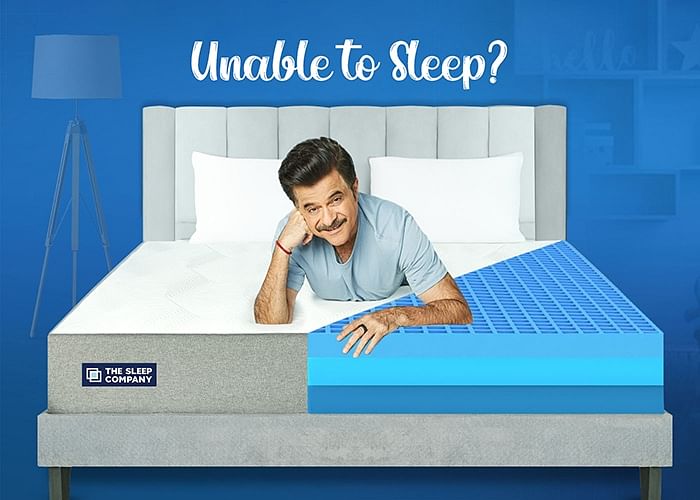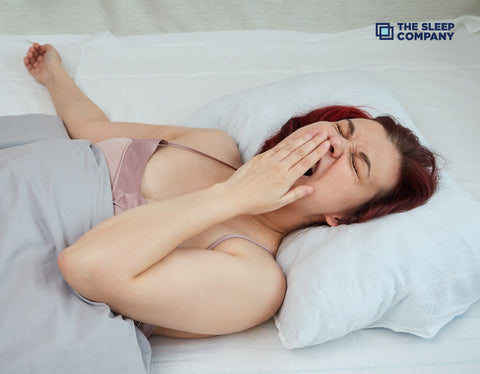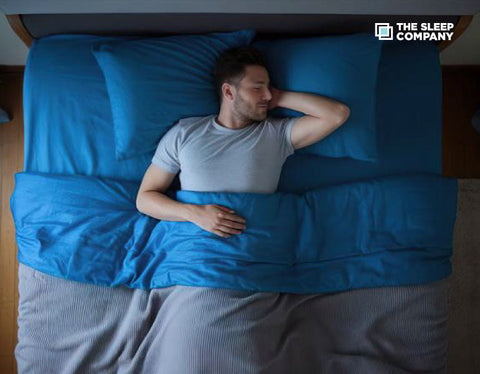My Cart

Unable to Sleep?

Here’s What you Need

You go to bed on time, and you shut off the TV in your bedroom and close your eyes, hoping to drift off quickly. To help you drift off to sleep, you scrolled endlessly through social media and somehow you ended up in this bizarre rabbit hole where your brain is screaming to you “SLEEP” but You just can’t! It’s frustrating and now you’ve no option left but to toss and turn all night with a tiny ‘hope’ of getting a wink of a sleep.
Before you reach for those sleeping pills, discover all the things that could cause you to be tired all day but awake at night. Once you identify what might be going on, you can take action to support better sleep. If it takes ages for you to fall asleep, this one’s for you.
You May Need a Sleep Reboot

Although we can quickly turn off the lights in the bedroom, we cannot instantly switch ourselves the moment we crawl into bed. However, if you pass out within 10 seconds or so after hitting your head on the pillow, it is a sign of sleep deprivation and rather not your ability to fall asleep quickly.
Many people struggle with getting a perfect balance of relaxation between brain and body. And that’s the foremost reason why most of us struggle to fall asleep on time. Sometimes our feelings and actions do not tend to create a rational connection, it’s the same as a contradiction of our emotional feelings and physical actions. For example, your brain will indicate you to sleep, but your bodily actions won’t accept the same. The opposite can also happen, your body is overtired and will crave peaceful slumber, however, your mind just won’t stop overthinking everything.
We know, it can be a real struggle. However, it’s not impossible. You may just need a sleep reboot and understanding your ‘golden hour’ can help you achieve that.
Understanding your ‘Golden Hour’
Your golden hour is that period of time before bed when you can relax and get ready for sleep. Making the most of your golden hour establishes a regular bedtime pattern, which is its finest benefit. Consistency strengthens our body clock, which will also make it simpler for us to go asleep every night.
Is this your Golden hour while you’re reading this? Then how many of these you’ve already ticked from the below ‘Golden hour checklist’ –
- Your ideal golden hour before bed should begin with some form of brain dump or to-do list. You might write this down or do it on your phone.
- Turn off all technology once you’ve completed your list to prevent blue light. Better yet, if you can dim the lights in your house. It has been demonstrated that using low-light settings at night and total darkness in the bedroom enhances both the quantity and quality of sleep.
- Now is a fantastic time to decide how to unwind the most effectively. It doesn’t matter if you choose to read a book or engage in a pastime, as long as it is unwinding and devoid of electronics.
- To get the best sleep, try to avoid consuming caffeine and alcohol after lunch at least three hours before bed. Try some chamomile tea to calm your nerves.
- It has also been demonstrated that including a warm bath in your bedtime regimen is effective. Baths can assist in kick-starting the process through which our body temperature decreases while we sleep.
- Make sure you’re sleeping on a supportive mattress, that’s firm enough to relax your pressure points and offers adequate support for back pain. You can save yourself from tossing and turning at night by choosing the best mattress online. If you’re planning to replace your old memory foam mattress, then you can buy mattress online with the extra perks of 10 years warranty and 100 nights trial period of SmartGRID Mattress.
What’s Keeping You Up at Night?
That’s the trickiest question. Thankfully we have the best Sleep Experts to answer that.
We know you are unable to get a wink of a sleep. Look at these scenarios and let’s find out what it can be that iskeeping you awake?

This is something known as an exhausted but wired syndrome. Typically, worry and anxiety are what fuel it. Even if you are weary, a racing mind can cause your nervous system’s “fight or flight” branch to become active, keeping you awake and unable to relax. If you consistently have this experience, you should practice relaxation techniques before bed to relieve stress and anxiety. These techniques include breathing exercises, progressive muscle relaxation, and guided meditation. Moreover, you should replace your mattress every ten years as it can also drastically affect your quality of sleep.
2. At night, as soon as you lay your head down, your mind and heart begin to race. How can you relax your body and mind so that you can sleep?

Meditation is one of the best methods for calming your mind before bed. Researchers divided 54 persons with chronic insomnia into groups and gave some of them the task of practicing mindfulness meditation in a study. As a result, the persons allocated to practice meditation acquired approximately 45 minutes more sleep each night after eight weeks. The overall intensity of sleeplessness was decreased in the meditation group. The researchers found that after six months, between 40 and 50 percent of those who practiced meditation had remitted their insomnia.
3. You often fall asleep and wake up 15 minutes later feeling anxious and short of breath. Your chest feels tight, your mind races, and your skin tingles. Why does this happen?

According to sleep experts, there are a few potential explanations for this. The possibility that you have sleep apnea is one explanation. The muscles in the back of their throats loosen up so much in people with this illness that they obstruct their airways, causing them to snore loudly and pant for air while sleeping. Your brain enters “fight or flight” mode when it detects that you have stopped breathing, which results in an increase in your heart rate, blood pressure, and adrenaline levels. This may jolt you out of sleep and cause you to feel panicky, which would account for the anxiety and shortness of breath you mention.
Another scenario can be that, you suffer from panic disorder. People with this frequently go through unexpected, severe, and unprovoked episodes of fear and panic. These episodes are referred to as nocturnal panic attacks when they happen while you’re sleeping. There are remedies available if you do have sleep apnea or a panic problem.
4. Will a nap help you “catch up” on sleep or just contribute to your insomnia?
In general, taking a nap during the day to catch up is not advised if you have trouble sleeping. It’s best to forgo the nap so that you’ll genuinely feel sleepy when your regular bedtime comes. By forgoing naps, you allow your weariness to become more and more of a burden throughout the day. As a result, You won’t feel as pressured to sleep when you go to bed at night. You should be able to take midday naps if you don’t have any issues with sleeplessness. In fact, many researches imply that naps might be good for the cardiovascular and cognitive systems.
If you do, then abide by some guidelines. First, since it will be more difficult to fall asleep at night if you nap after 2 o’clock, avoid doing so. Taking a nap too late in the day is similar to nibbling before a meal since it undermines a restful night’s sleep. Second, try not to nap for more than 20 minutes at a time. Your brain won’t enter the later stages of sleep as a result. By doing this, you’ll prevent sleep inertia, “almost like a sleep hangover that occurs from naps.” For the first hour following the nap, it may make you feel worse than before.
5. Do women have more difficulty sleeping than men?

Yes, generally speaking. According to studies, women are around 40% more prone than males to experience insomnia. There are numerous explanations for this. Genetics plays a role in it. The hormonal changes that take place during the menstrual cycle, pregnancy, and menopause are partly responsible for it. The higher incidence of anxiety and sadness among women is another factor. These two mental health issues, which are two of the main causes of sleeplessness, are twice as likely to affect women as men, according to studies.
6. Your partner snores so loudly that it constantly wakes you up. How can you sleep soundly with a noisy bed mate?

The act of snoring alone is not always a medical issue. However, it might indicate sleep apnea or another sleep condition. Your best approach is to get your companion to get checked out by a primary care physician or a sleep expert.
Still Awake?

If you’re still awake, we’ve got some extraordinary sleep facts for you –
Did you know
- Human are the only mammals that willingly delay sleep.
- It takes the typical person 7 minutes to fall asleep.
- One-third of our lives is spent sleeping.
- You actually burn more calories sleeping than you do watching TV.
- A person who is snoring cannot be dreaming.
- Sleeping on your front can aid digestion.
- Sleep deprivation will kill you more quickly than food deprivation.
- Sleep experts have discovered a direct link between people’s favourite sleeping positions and their personalities.
- If you convince yourself that you slept well last night, even if you didn’t, you can trick your brain into thinking you aren’t tired. It’s called ‘Placebo Sleep’. It improves cognitive function, and it makes you perform better than when you constantly complain about being tired all day.
- A world record was made when Randy Gardener went 264 hours or 11 days straight without sleeping. He made this record at the age of 17 in 1964 and still holds it to this day.
Are you planning to break this record? We hope you won't break this record and sleep on time. Happy Snoozing!



































































